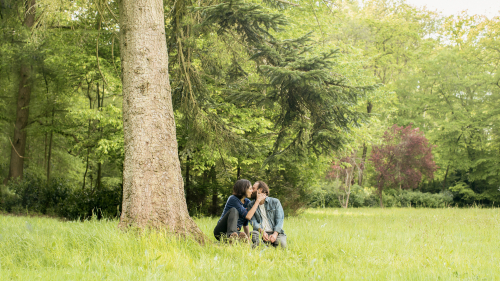
Carole Bethuel
MOVIE REVIEW
Suspended Time (2024)
As the longest year any of us ever lived recedes into memory, we all have a decision to make. Do we forget the way 2020 made us feel the way people who survived the Spanish flu did a century ago, or do we try to figure out how we can remember the most painful year of our lives (so far) without going completely crazy? It's an impossible question of course and everyone will have a different reaction to it; and certainly there are people who will not be able to bear “Suspended Time's” depiction of a lockdown year on principle, but it certainly helps that the version of the Covid pandemic shown here was suffering on the lowest possible setting.
The four people at the heart of the film are two couples. Paul (Vincent Macaigne, standing in for writer-director Olivier Assayas) is a film critic and general intellectual in between projects; and his brother, Etienne (Micha Lescot), is a music journalist and radio guy who has to jerry rig a studio in the attic in order to keep working. They are back in their childhood home, which is in a rural village next door to a villa, the grounds of which they have free access to. This is convenient for jogging, private zoom sessions with your shrink, and for Paul to go play tennis with his partner, Morgane (Nine D’Urso), who's a movie director researching her next project. Etienne is also locked down with his new girlfriend, Carole (Nora Hamzawi). They were dating secretly while Etienne finalized his divorce; and this is the first time they've spent serious time together.
The brothers’ parents are long dead, Morgane conveniently never mentions her family and Carole’s kids are with their dad, as Paul's daughter, Britt (Magdalena Lafont), is with her mother, Flavia (Maud Wyler), so really things are as easy as can be. Everyone is fully able to focus on ordering socks online and bickering about the best way to sanitize the groceries and getting annoyed that Etienne has gotten so into crepes they're all he eats unless someone else is cooking. The home, which seems to be Mr. Assayas's own house, is one of those rambling old places beloved by the bourgeoisie, filled with old art books and antique furniture and ancient paintings picked up for a steal instead of something genuinely valuable. It's the kind of casual luxury many people would kill for, but mainly the relaxed, delightful lifestyle will inspire hollow laughter in anyone who endured lockdown with their children. On the other hand, a little too much truth is often too much, which means this depiction of lockdown isn't remotely painful to watch. But as the adult brothers squabble over playlists during dinner in the garden while their women lean supportively on their shoulders the question becomes why was this movie made?
And it seems the answer is Mr. Assayas wanted to remember how there can be beauty even in the most awful circumstances – it's accurate about the excellent springtime of that year – and honor the ways in which the entire world stopped and took stock even as we fought to survive. Showing people who didn't have to fight very hard is the spoonful of sugar which helps the medicine of revisiting lockdown go down, but the final note is smug indeed in how to handles what the legacy of the pandemic will be for our children. The year 2020 is not one any adult who lived it will forget, but a pleasant film like this will make the retelling of it safe for the children yet to come.
Comments